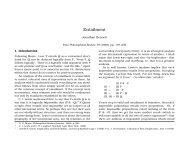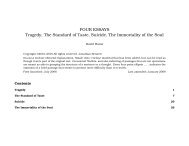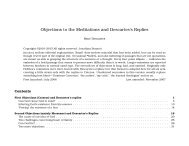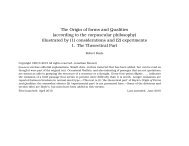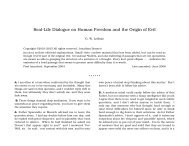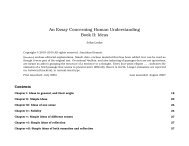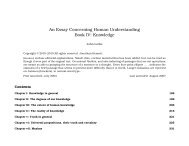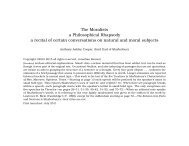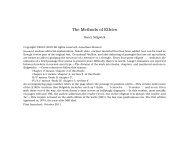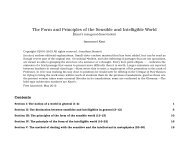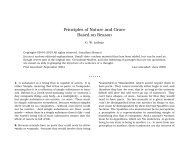A Vindication of the Rights of Woman with - Early Modern Texts
A Vindication of the Rights of Woman with - Early Modern Texts
A Vindication of the Rights of Woman with - Early Modern Texts
Create successful ePaper yourself
Turn your PDF publications into a flip-book with our unique Google optimized e-Paper software.
The <strong>Rights</strong> <strong>of</strong> <strong>Woman</strong> Mary Wollstonecraft 5: Pity bordering on contempt<br />
<strong>of</strong> society was a school <strong>of</strong> flirting and art [here = ‘<strong>the</strong> skillful<br />
management <strong>of</strong> <strong>the</strong> o<strong>the</strong>r sex’]. At <strong>the</strong> age <strong>of</strong> ten or eleven—even<br />
sooner, indeed—girls began to flirt, and to talk (<strong>with</strong>out being<br />
reproved for it) <strong>of</strong> establishing <strong>the</strong>mselves in <strong>the</strong> world by<br />
marriage.<br />
In short, almost from <strong>the</strong>ir very birth <strong>the</strong>y were treated<br />
like women, and were given compliments instead <strong>of</strong> instruction.<br />
Compliments weaken <strong>the</strong> mind. When society treated<br />
girls in this way, it was assuming that •Nature acted like a<br />
step-mo<strong>the</strong>r when •she formed this after-thought <strong>of</strong> creation.<br />
Not allowing <strong>the</strong>m understanding, however, it was only<br />
consistent to subject <strong>the</strong>m to authority independently <strong>of</strong><br />
reason; and to prepare <strong>the</strong>m for this subjection Rousseau<br />
gives <strong>the</strong> following advice:<br />
·ROUSSEAU·<br />
As well as being active and diligent, girls should be early<br />
subjected to restraint. This misfortune, if that’s what it is,<br />
is inseparable from <strong>the</strong>ir sex; and if <strong>the</strong>y ever throw it <strong>of</strong>f<br />
<strong>the</strong>y will suffer evils much crueller than that. They must<br />
throughout <strong>the</strong>ir lives be subject to <strong>the</strong> most constant and<br />
severe restraint, which is that <strong>of</strong> decorum; so <strong>the</strong>y must<br />
get used to it early, so that it won’t hit <strong>the</strong>m too hard later<br />
on. They should also get used to <strong>the</strong> suppression <strong>of</strong> <strong>the</strong>ir<br />
caprices, so that <strong>the</strong>y will be readier to submit to <strong>the</strong> will <strong>of</strong><br />
o<strong>the</strong>rs ·later on·; even if it is work that <strong>the</strong>y are most fond <strong>of</strong>,<br />
<strong>the</strong>y should be sometimes compelled to lay it aside. If <strong>the</strong>ir<br />
upbringing is too permissive, <strong>the</strong>ir basic propensities will<br />
give rise to dissipation, levity, and inconstancy. To prevent<br />
this abuse, we should teach <strong>the</strong>m above all things to restrain<br />
<strong>the</strong>mselves properly. Our absurd institutions reduce <strong>the</strong><br />
life <strong>of</strong> a modest woman to a perpetual conflict <strong>with</strong> herself,<br />
though it is fair that this sex should share in <strong>the</strong> sufferings<br />
arising from <strong>the</strong> evils it has caused us.<br />
56<br />
·WOLLSTONECRAFT·<br />
And why is <strong>the</strong> life <strong>of</strong> a modest woman a perpetual conflict?<br />
Because this very system <strong>of</strong> education makes it so. Modesty,<br />
temperance, and self-denial are <strong>the</strong> sober <strong>of</strong>fspring <strong>of</strong> reason;<br />
but when sensibility is developed at <strong>the</strong> expense <strong>of</strong> <strong>the</strong> understanding,<br />
such weak beings must be restrained by arbitrary<br />
means [i.e. not by nature but by rules devised by humans], and so<br />
be subjected to continual conflicts. If you give more scope<br />
to <strong>the</strong>ir activity <strong>of</strong> mind, nobler passions and motives will<br />
govern <strong>the</strong>ir appetites and sentiments; ·and this government<br />
will be less conflicting because it will come from <strong>with</strong>in <strong>the</strong><br />
woman ra<strong>the</strong>r than from outside·. . . .<br />
·ROUSSEAU·<br />
Women ought not to have much liberty. When something is<br />
permitted to <strong>the</strong>m, <strong>the</strong>y are apt to indulge in it excessively.<br />
Addicted in everything to extremes, <strong>the</strong>y are even more<br />
carried away in <strong>the</strong>ir diversions than boys.<br />
·WOLLSTONECRAFT·<br />
Well, slaves and mobs have always gone to excesses in that<br />
way once <strong>the</strong>y have broken loose from authority. The bent<br />
bow straightens <strong>with</strong> violence when <strong>the</strong> hand that is forcibly<br />
holding it is suddenly relaxed; and sensibility, <strong>the</strong> plaything<br />
<strong>of</strong> outward circumstances, must be subjected to authority or<br />
moderated by reason. Rousseau continues:<br />
·ROUSSEAU·<br />
This habitual restraint makes women tractable in a way<br />
that <strong>the</strong>y’ll need throughout <strong>the</strong>ir lives: <strong>the</strong>y are constantly<br />
under subjection ei<strong>the</strong>r to <strong>the</strong> men ·who are <strong>the</strong>ir partners<br />
or husbands· or to <strong>the</strong> opinions <strong>of</strong> mankind, and <strong>the</strong>y are<br />
never permitted to set <strong>the</strong>mselves above those opinions. The<br />
most important qualification in a woman is good-nature<br />
or sweetness <strong>of</strong> temperament. Formed to obey such an<br />
imperfect being as man is—<strong>of</strong>ten full <strong>of</strong> vices and always full



